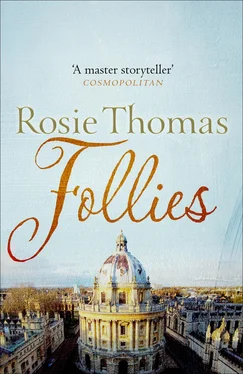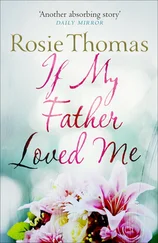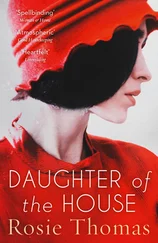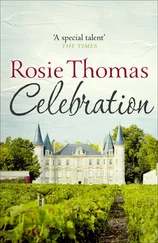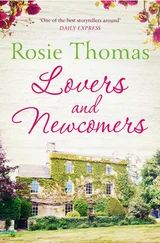Helen drew up her knees and rested her chin on them. It was cold in her room, and colder still sitting on the window seat against the misted glass, but she didn’t think of moving to turn on the heater. Instead she went on staring out at the height of Tom Tower and the smooth stone front of Christ Church. It was a grey cloudy November day with a vicious wind that whipped the black branches of the trees. On the pavements below, Helen could see passers-by shrunk into their winter clothes, their faces raw in the wind.
Very faintly she could hear the river and the hum of traffic but inside it was completely silent. Follies had the ability to swallow sound and spin a sense of isolation around the listener.
Once Helen had relished the peace, but lately it had oppressed her.
Work, her faithful remedy, was no longer any use. For days she had stared blankly at her books, watching the lines of grey type jumping meaninglessly in front of her eyes. Then she had given up the struggle. All she had in its place was the persistent whisper of guilt, chaffing her painfully but doing nothing towards driving her back to her desk.
Helen knew that if she wasn’t working, she had no justification for staying in Oxford. That knowledge was the most difficult thing to live with. If she wasn’t working, then she should be at home where she was needed.
Last time they had talked, Helen’s mother had struggled to keep the anxiety out of her voice, for her daughter’s sake, but Helen had heard it anyway. Her mother was lonely, there was so little money, and the two of them had nobody to turn to but each other.
Helen winced and pressed her forehead against the cold window pane.
What’s the matter with me? she asked herself again, knowing the answer all too well.
She had done something she would have believed impossible. She had fallen in love, awkwardly and painfully, and whichever way she turned, there was no escaping or forgetting it.
In the days since Pansy had come, Helen had seen Oliver a mere handful of times, but each time she had wanted him more. He seemed to have the power, simply by existing, to blot everything else out of her life. When she saw him sitting at the table in Rose’s kitchen she was oblivious of Rose’s sly watchfulness. At the few play rehearsals she had been to, the rest of the cast – even Pansy – shrank to grey shadows beside him.
She found that her eyes followed him when he moved, even though she hated her own slavishness.
Pansy’s arrival seemed to have made no difference. Pansy herself gave no more of her attention to Oliver than to anyone else. She simply laughed and joked from day to day with everyone’s eyes on her, from Oliver to Gerry Pole who watched her with dog-like devotion. Whether Pansy was present or nor, Helen’s relationship with Oliver was as puzzlingly tenuous as it had been from the beginning.
But it was still there.
His arm would drop around her shoulders and pull her close to him, or he would kiss the top of her head and draw her hair up to reveal the fragile whiteness of her neck. She would turn blindly to him for a second, and then he would be gone again.
Once, a little while after the auditions, he had come to find her in her room. He had leaned against the door, smiling down at her, and from the brightness and distance in his eyes, she guessed that he had been taking drugs again. But it was unthinkable to resist when he reached for her, and pulled her down beside him on the narrow little bed.
Blindly, she pressed against him, thinking here, now, he’s with you. Nothing else matters.
Afterwards, when he lay in her arms and she was secure in his warmth, Helen studied the curves and angles of his face. She thought she saw in them the gentleness of the other Oliver, the half of himself he must feel compelled to hide for some reason that she didn’t understand.
Oliver had drifted off to sleep and Helen had gone on lying beside him, her mouth against his hair, lost in the pleasure of possession.
When he woke up again, he seemed to be listening for something in the quiet of the house.
Then he rolled away from her, his lazy, assured manner making her doubt the existence of another Oliver after all. When he was dressed he had refused her offer of a cup of tea, kissed her briefly, and gone away.
Helen had quickly learned to accept that.
He came and went as he wanted, and up until now she had seized gratefully and unquestioningly on the few times that they were together without asking for anything more.
It occurred to her that she wouldn’t have known what else to ask for, anyway.
Helen frowned. Up until the last few days, that was how it had been. But this afternoon was different. She was not simply numbed by his presence, she was hurt by it. She hadn’t seen Oliver for four days, and her need for him was growing acute. Part of the grey afternoon’s discomfort was the way her body ached for him. I was so self-controlled once, Helen remembered. Is this what sex is like for everyone? So potent as to rub out everything else, and so bitterly painful when it isn’t gratified?
The other sensation that troubled her was a dull sense of foreboding. The room was heavy with it and for a moment Helen imagined that the clouds outside the window bulged with it. Then she rejected the fancifulness of the idea with irritation. The rational Helen whose voice was still sometimes just audible told her that she was being a fool, and that she should go back to her work and forget Oliver until he appeared again. But the emotional Helen who ruled so capriciously now knew that she couldn’t do that.
She was sunk in irritable apathy, hurt and impatient and powerless to do anything. The solitude and silence pressed around her, almost tangible.
Suddenly Helen jumped up. She couldn’t bear to sit here any longer. Someone to talk to, that was what she needed.
There was no response to her knocking at Chloe’s door. Along the panelled gallery at the head of the stairs, Pansy’s door was open. Helen looked in at the jungle of record sleeves, empty cups and discarded clothes and half smiled. Pansy was always out somewhere.
Helen leaned on the carved banister and looked down into the body of the hall. The panelling seemed to absorb the light. It was numbingly quiet. Then, astonishingly, Helen heard a babble of voices. Almost at once she realised that it was a radio play. Rose must be listening in the kitchen, probably squashed into her battered armchair beside the Aga. Helen was still a little afraid of Rose, but her need for human company now was so imperative that she didn’t hesitate.
‘Come in, love,’ Rose said easily. She was indeed in the armchair, with the massive shapeless tubes of her legs propped up on a stool. ‘Sit down somewhere. Move that pile of stuff off the chair.’
Helen tried not to look at the overflowing ashtrays and smeared plates on the table. Rose lived complacently in a ripe, untidy web like a fat spider. Helen came in here rarely, and mostly in the hope of seeing Oliver. When she did meet him, it always surprised her, because he looked bored and irritable and faintly disgusted by the mess.
As she sat down Helen saw Gerry leaning against the dusty dresser behind the door. He was unshaven and his clothes were filthy. He was clutching a teacup and, as he stared at her with unfocused eyes, he lifted it and took a gulp, smacking his lips. There was a strong smell of whisky.
Helen moved uncomfortably. When she met Gerry on the stairs or along the deserted gallery, his hands invariably reached out to touch her while he joked, disconcertingly, in his cultured voice.
‘Don’t mind him,’ Rose ordered. ‘He’s having one of his bad days.’
Pansy and Chloe had joked about that. Gerry’s ‘bad days’ were the ones when he got drunk. Good days were the ones when he stayed sober, despite his failure to write a word of the non-existent novel promised to follow his single, long-ago success.
Читать дальше
